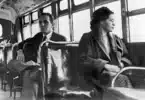Everyone is entitled to human rights. The only qualification is that you are a human being. The Universal Declaration of Human rights explains that human rights are “inherent to all human beings, regardless of race, sex, nationality, ethnicity, language, religion, or any other status.” These rights include civil, political, economic, cultural, and social rights such as the right to life, right to education, and freedom of expression. Throughout history, activists and groups have fought for these rights, harnessing the power of community and writing. These human rights slogans prove that words are powerful.
“The rights of every man are diminished when the rights of one man are threatened.” – John F. Kennedy
JFK spoke these words on June 11, 1963, in an address that announced civil rights legislation. This occurred after Governor George Wallace attempted to block two black students from enrolling at the University of Alabama. Birmingham, Alabama was the site of many confrontations, such as police turning dogs loose on African-Americans. JFK had been dragging his feet on civil rights, but in this address, he acknowledged its necessity. The next week, he sent his civil rights bill to Congress.
“We must take sides. Neutrality helps the oppressor, never the victim. Silence encourages the tormentor, never the tormented.” – Elie Wiesel
This slogan comes from writer and activist Elie Wiesel’s Nobel Acceptance Speech in 1986. A Holocaust survivor, Wiesel wrote 57 books, including Night, which described his experiences in the concentration camps. For the rest of his life, he campaigned for human rights around the world. This quote pushes back against the idea that anyone can be neutral when it comes to human rights. Not taking action against abuses is the same as participating in the abuses.
“Women’s rights are human rights.” – Hillary Clinton
This phrase did not originate with the former first lady, but its most famous use comes from her. Variations of “Women’s rights are human rights” circulated in the 1980s and 1990s. Clinton’s use of the phrase comes from her speech in 1995 at the UN’s Fourth World Conference in Beijing. Since then, it’s become a rallying cry for the women’s movement and used frequently in media. While a seemingly obvious statement, it’s important to remember because women’s rights are still threatened around the world.
“We can disagree and still love each other unless your disagreement is rooted in my oppression and denial of my humanity and right to exist.” – James Baldwin
One of writer James Baldwin’s most famous human rights slogans, this quote reveals where to draw the line. Baldwin, who lived from 1924-1987, wrote on race, sexuality, and class. His works and words are especially relevant to many people today. We live in very divisive times and there’s a lot of talk about civility. However, this quote makes it clear that denying someone’s humanity and human rights is different than other disagreements.
“Peace can only last where human rights are respected, where the people are fed, and where individuals and nations are free.” – The 14th Dalai Lama
A refugee in India since the 1959 Tibetan uprising, the 14th Dalai Lama is famous for his support of human rights. He received the Nobel Peace Prize in 1989. This quote comes from his acceptance speech. In one sentence, it sums up how to achieve lasting peace. Human rights are the key.
“While poverty persists, there is no true freedom.” – Nelson Mandela
The first black president of South Africa and activist, Nelson Mandela is famous for his words of wisdom. In this quote, he recognizes that no one can be free while trapped in poverty. The consequences of poverty – a lack of access to education, healthcare, good work, etc – violate a person’s human rights. To ensure human rights are respected everywhere, poverty must be addressed.
“Where, after all, do universal human rights begin? In small places, close to home—so close and so small that they cannot be seen on any maps of the world […] Unless these rights have meaning there, they have little meaning anywhere.” – Eleanor Roosevelt
This human rights slogan describes why universal human rights are so important. Eleanor Roosevelt spoke these words as the chairperson of the Commission on Human Rights, which created the definitive document on human rights: The Universal Declaration of Human Rights.
“I have a dream.” – Martin Luther King Jr.
Arguably one of the most recognizable four-word sentences in history, this quote is part of Martin Luther King Jr’s speech during the March on Washington. The entire speech is famous and presents Dr. King’s vision of a world without racism. Even those who aren’t well-versed in Dr. King’s life or the rest of the speech recognize the phrase, “I have a dream,” and know it’s about civil rights.
“It means a great deal to those who are oppressed to know that they are not alone. Never let anyone tell you that what you are doing is insignificant.” – Desmond Tutu
A rallying cry for activists around the world, this slogan comes from Desmond Tutu, a famous South African activist and theologian. Throughout his life, he’s championed human rights and won the Nobel Peace Prize. Amnesty International and other organizations/activists that raise awareness of human rights issues display this quote.
“First they came for the socialists, and I did not speak out, because I was not a socialist. […] Then they came for the Jews, and I did not speak out, because I was not a Jew. Then they came for me, and there was no one left to speak for me.” – Martin Niemoller
This poetic quote is an edited version of a confession made by a German Lutheran pastor. It embodies the reality that those who violate human rights will eventually violate everyone’s human rights. Silence helps the oppressor. The original groups listed in the quote are sometimes changed to reflect current times.












